Does membership of campus ministry impact student success at TCU?

For many college students, finding belonging and true community is very difficult. It is often their first time away from home and no one really guiding them on how to spend their time. Many universities, including TCU, have many different campus organizations and avenues for those students to find community, but it still is difficult to make those connections. As a result, they often feel very isolated and lose motivation to perform as well.
Students often will join campus organizations that they identify with. Whether it be religiously, politically, habitually or maybe they’re just looking for a group of friends, students often look to campus organizations to find belonging. There is a great variety of over 400 campus organizations for TCU students to choose from.
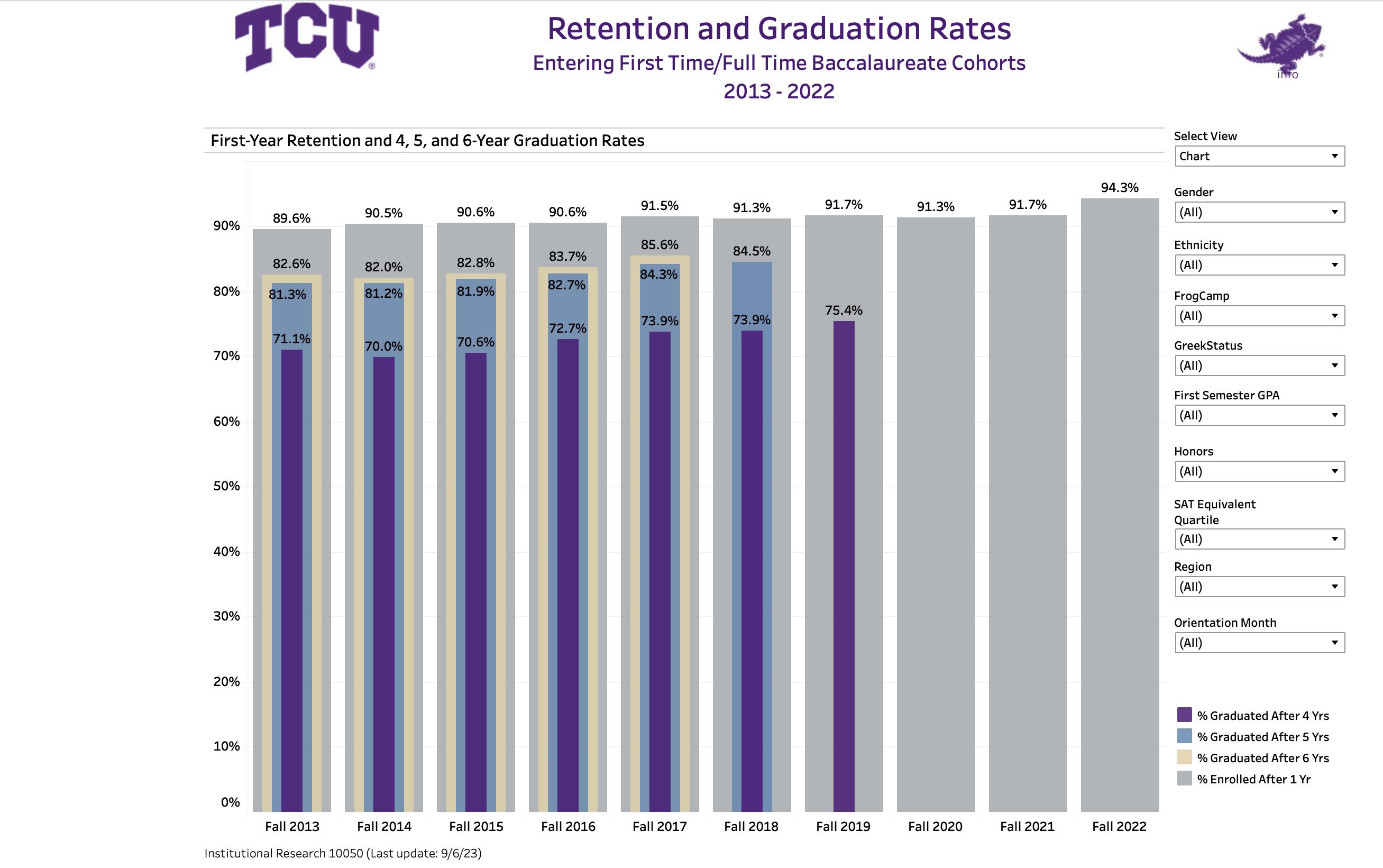
TCU first-year retention and graduation rates (via TCU Institutional Research)
TCU first-year retention and graduation rates (via TCU Institutional Research)
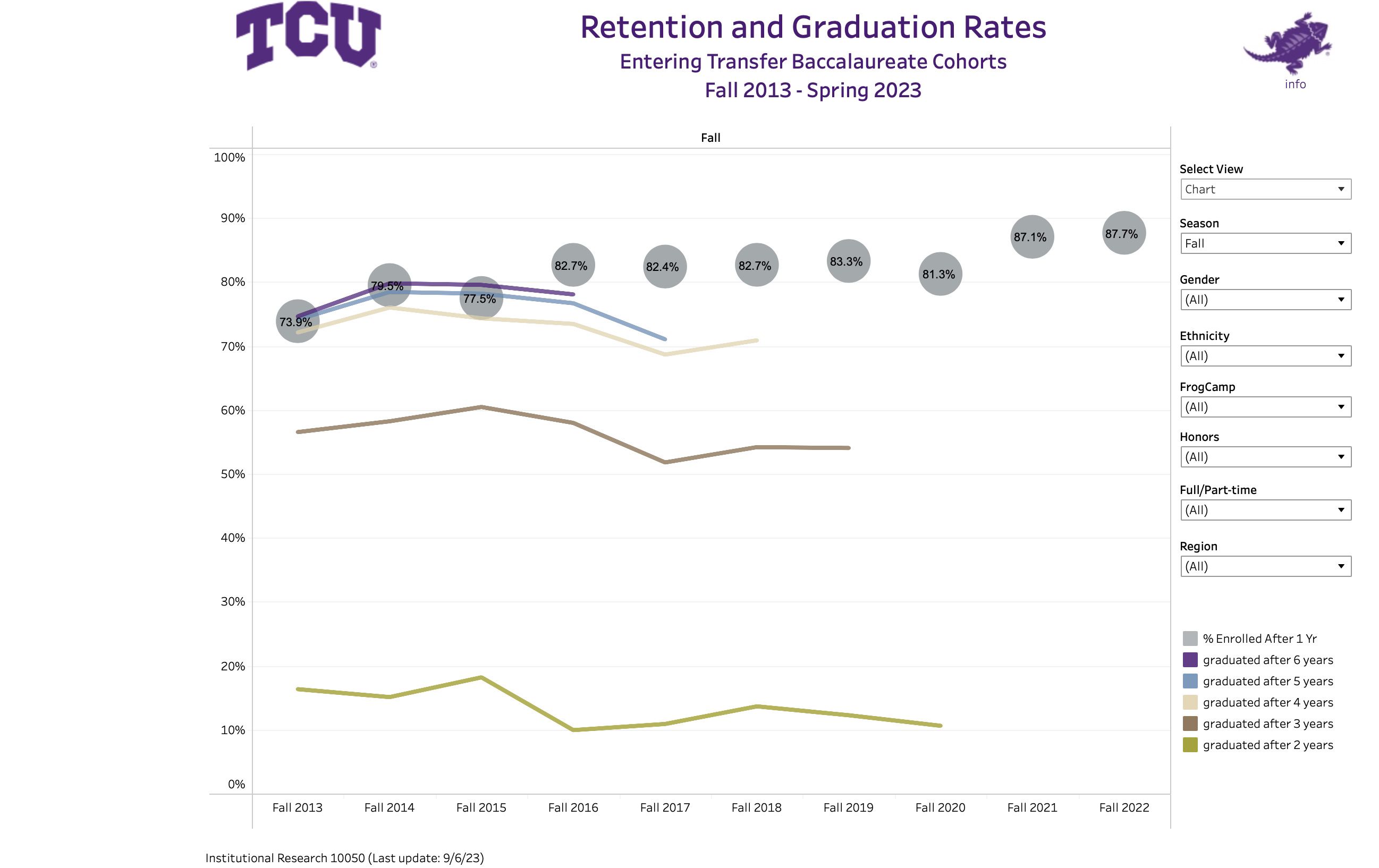
TCU transfer student retention and graduation rate statistics (via TCU Institutional Research)
TCU transfer student retention and graduation rate statistics (via TCU Institutional Research)
Over the past decade, TCU’s first-year student retention rate has risen from 89.6 percent in 2013 to 94.3 percent in 2022 (according to TCU Institutional Research), and the transfer retention rate is up significantly from 73.9 percent in 2013 to 87.7 percent in 2022. The current national average retention rate is nearly 76 percent (according to National Student Clearing House). Besides community college transfers and COVID-19 affects, the most prominent reason students transfer universities in the United States is due to social isolation (according to bestcolleges.com).
Over that same period, the first-year student graduation rate at TCU increased from 89.6 percent to 94.3 percent. The national average graduation rate among private universities in the United States is 68 percent according to the National Center for Education Statistics.
The goal of this study is to see if students who identify with a campus organization they are involved in, specifically Christian students, contribute to the high retention rate at TCU.
In this study, research is performed on Christian students who join a campus ministry. Since students often identify with the organizations they join, it is natural for students to find community with those who share their religious beliefs. Two campus ministries are observed in this study to find out if being a member of one of the ministries impacts student success at TCU.
For the study, membership is defined as being involved in any way such as, but not limited to small groups, attending large gatherings, being in the GroupMe etc. Success is determined based on retention rate and graduation rate.
A study done at the University of Northern Iowa in 2021 by Rachel Jean Kitrell titled “Ministry matters: A study of the relationship between campus ministry and socialization” concluded that there is evidence that links student socialization to involvement in a campus ministry. This is the first study that can directly link campus ministry involvement and student socialization on university campuses.
In a talk she gave at MIT’s Teaching and Learning Lab, Dr. Maithreyi Gopalan speaks about research she conducted in 2019 at Pennsylvania State University that shows in certain contexts, students who feel a sense of belonging perform better academically, have higher retention rates, and have overall better mental health track records. Gopalan looked at students who joined campus organizations that they found some identity in, whether it be spiritual, political, or habitual. She concluded that it is important for students to find a group to identify with and belong to when they get to college.
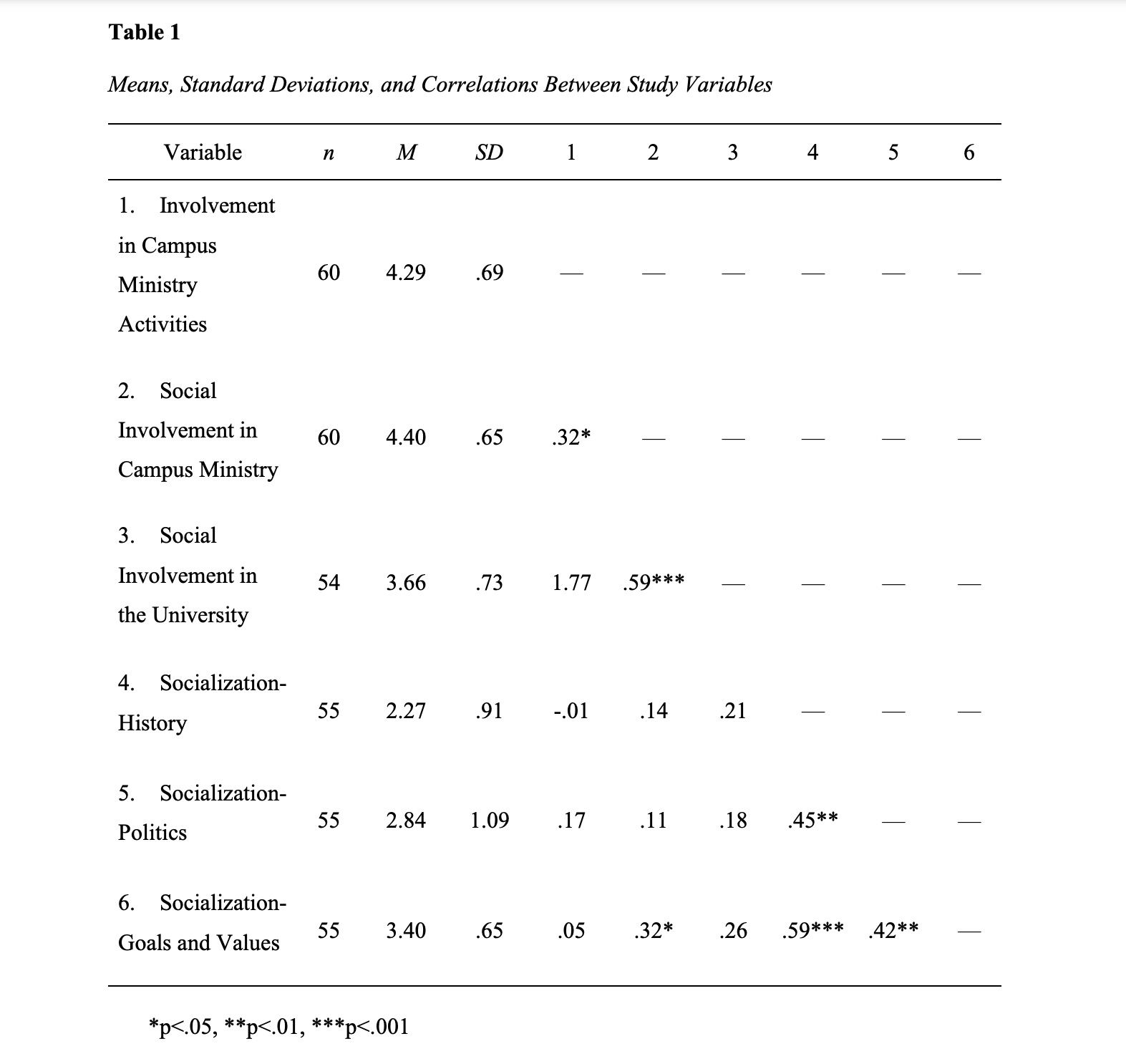
Results from Kitrell's study (via University of Northern Iowa open access honors study)
Results from Kitrell's study (via University of Northern Iowa open access honors study)

Photo of a Young Life sophomore small group gathering (Photo credit: Jake Peterson)
Photo of a Young Life sophomore small group gathering (Photo credit: Jake Peterson)

Students singing worship songs at an RUF large group gathering (Photo credit: Henry Haas)
Students singing worship songs at an RUF large group gathering (Photo credit: Henry Haas)
To conduct quantitative research for this study, a six-question survey was sent to 184 students who are involved in either TCU College Young Life or TCU Reformed University Fellowship (RUF). Of the students who received the survey, 31 students responded. There was a fairly even spread of who took the survey, 11 were juniors, eight were first-year students, six were seniors and five were sophomores. One student chose not to say what class they were.
To conduct qualitative research for this study, two interviews were conducted. One interview is with TCU senior Henry Haas who is the campus president for RUF and has been involved with the ministry since he was a freshman in the Fall of 2020. The other interview is with TCU sophomore Isaac Watkins, who found Young Life at the activities fair when he was a first-year student coming to TCU in August 2022. Watkins has been involved with Young Life ever since and has become a student leader in the organization.
Q2: What year did you join a campus ministry at TCU?
A vast majority of students who are involved in a campus ministry at TCU joined when they were a first-year student. The results show that about two in every three students who took the survey joined when they were a first-year student. It is plausible to guess that those who did not join when they were a first-year student either were transfer students or were looking for community as they got older.
Q3: Is your involvement in a campus ministry a reason you are still at TCU?
26 students who took the survey said that their involvement in a campus ministry is a reason that they are still at TCU. The 83.9 percent of students who said that would put it both under the first-year retention rate at TCU and the current transfer retention rate as well. However, it is still significantly higher than the national average retention rate.
Q4: Has your involvement in a campus ministry helped you stay on track to graduate from TCU?
24 of 31 students said that their involvement has helped them stay on track to graduate from TCU. Again, that would be significantly lower than the average graduation rate among students at TCU, but higher than the national graduation rate among private universities.
Q5: What kind of impact has being involved in a campus ministry had on your experience at TCU?
Every student that answered this question on the survey said that their experience at TCU has been improved by being involved in a campus ministry. While there may not be a clear correlation in the other questions from this survey, these responses make it clear to any Christian student looking to improve their experience at TCU to heavily consider joining a campus ministry.
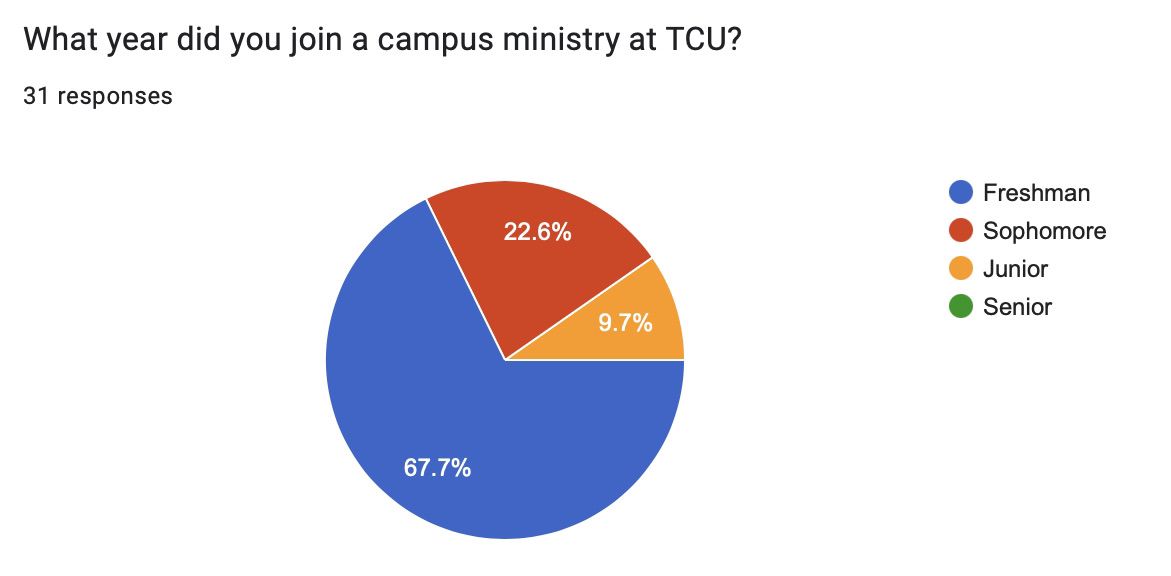
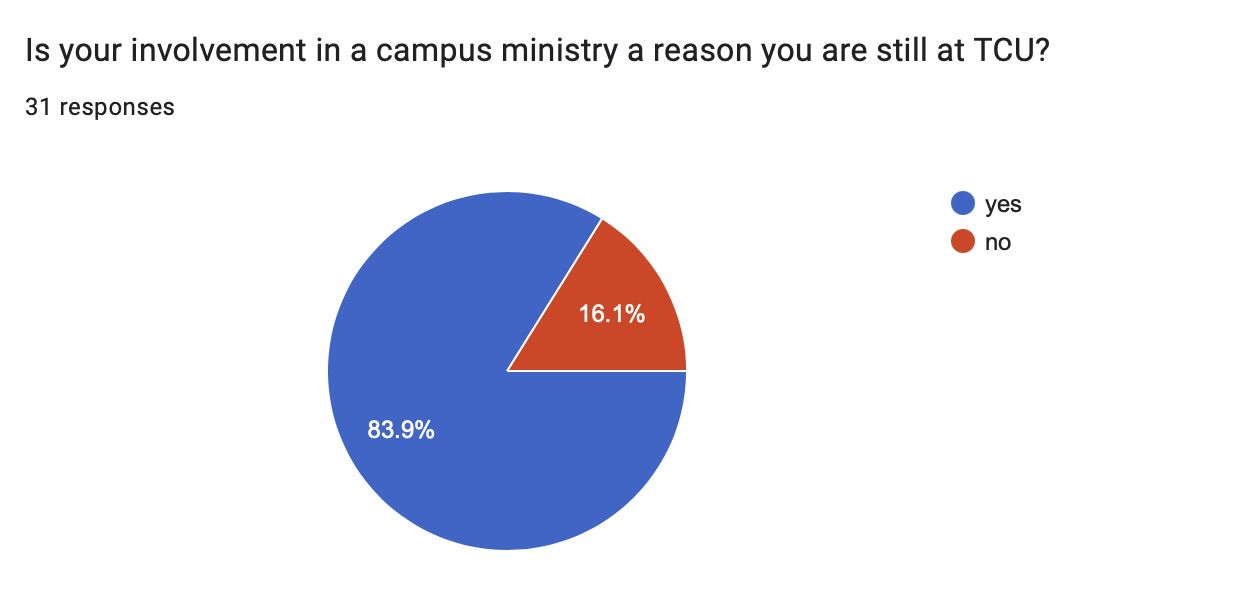
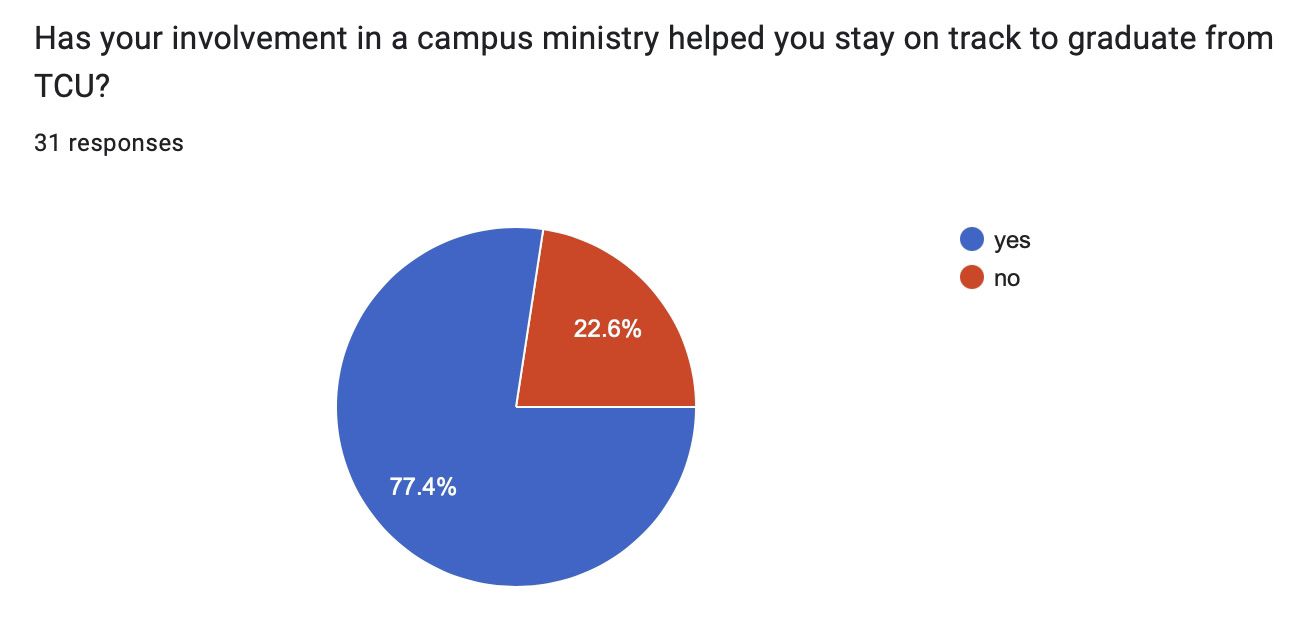
“Coming to college knowing no one was hard,” said TCU sophomore Isaac Watkins. “But I was able to find such a good group of people within Young Life that has made my time at TCU very enjoyable.”
Before coming to TCU in 2022, Watkins had never stepped foot inside a church in his life. He also did not know a single person at TCU when he arrived. Even though he did not grow up in a traditional Christian background, he was still able to find belonging in a campus ministry that has helped him transition to college.
Henry Haas was a first-year student in the Fall semester of 2020. Given that it was the middle of the COVID-19 pandemic, making new friends was very difficult in the isolated environments. However, weekly gatherings with RUF was about the only place that it was possible for him to make new friends in those circumstances.
“The only communicative activity I had was RUF,” Haas said. “Every week, it was the only place I was getting consistent fellowship with people, only place I was getting to know new folks outside of my dorm. Especially as the years went on and RUF went back to normal, everything kind of came together in that way as just a large community of people that met together every week consistently.”
Haas is now the campus president of RUF at TCU and hopes to create the same type of environment for all types of students at TCU.
Based on the data collected in the surveys, it is difficult to say whether involvement in a campus ministry has any direct impact on student success at TCU. However, results from the survey do indicate that students’ experiences at TCU have been improved by involvement in a campus ministry, which other studies have shown it to improve student success. Every student who responded to the survey said their experience at TCU has been improved because of it. From what was collected in the interviews, it doesn’t matter what your background is or how long you’ve been a student at TCU, if you’re looking for a place to get connected campus ministries at TCU are always welcoming new people and have been proven to improve the overall experience at TCU.
If this study were to be conducted again, it would be ideal if there could be a wider range of campus organizations investigated. Additionally, the questions on the survey could have been clearer for students to know how their time at TCU was affected by the campus ministries.
